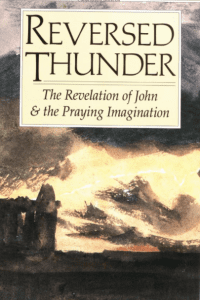Eugene Peterson opens up Revelation 12-14 under the title “The Last Word on Politics” in Reversed Thunder: The Revelation of John and the Praying Imagination. Don’t you dream of that in these endless politically-infested days—the last word? The fascinating feature of these Revelation chapters is St. John’s vision of the birth of Jesus (Revelation 12). “This is not the nativity story we grew up with, but it is the nativity all the same. …It is St. John’s genius to take Jesus in a manger attended by shepherds and wisemen and put him in the cosmos attacked by a dragon. The consequence to our faith is that we are fortified against intimidation” (121-122). The dragon tries to kill the infant Christ and fails. The dragon turns on the mother and fails to kill her. The dragon then turns on the followers of the Christ. As followers resist the dragon at risk of their own lives, the dragon is hurled out of heaven as a failure. “The kingdom of the world is, indeed, becoming the kingdom of our Lord and his Christ, and he shall reign forever and ever” (Revelation 11:15).
Like St. John’s churches, we live in the “now/not yet” of the promise of the uncontested reign of God through the Christ. John’s first audience read these words and still opened their doors each morning to face a violent Roman Empire. They faced intense forces seeking to divert them from Jesus, even to frighten them into deserting the One they love. How is it that many will face death while singing praises to the Lamb? “Now have come the salvation and the power and the kingdom of our God, and the authority of his Christ” (Revelation 12:10). The dragon and the beasts are full of bluster, intimidation, and fury. The churches, having found a new politics, are not “frightened into disobedience… they will not be “deceive[d] into illusion” (122).
Peterson describes the politics of the dragon, sea beast, and land beast—“a satanic trinity that infiltrates the political world in order to deflect our worship from God whom we cannot see to the authorities that we can see, and to deceive us into buying into a religion or belief-system that has visible results in self-gratification” (127). Peterson reminds us of the politics of the Lamb, the politics of the church. “The politics of the Lamb takes the ordinary and basic elements of our obedience (offering our adoration in worship, listening to the proclaimed word, practicing a holy life) and develops them into the ultimate and eternal. The politics of the Lamb, by showing the plainest details of our daily faith are significant in a cosmic drama, protects us from hubris and guides us into the maturity that pours intelligence and energy into what is before us, making a work of holy art out of the ordinary” (132). Dragon politics are superficial and full of pretension, seduce the ego and exacerbate pride. “Politics is the management of power, whether in marriage and family, business and trade, congregation and committee, legislature and convention, school classroom and executive boardroom. We are in politics whether we want to be or not, whether anyone voted for us or not. … Will it be the power of coercion or the power of grace?” (133).
When a single, weary hobbit, Frodo, dropped the ring into the fire, his single, private act of enduring obedience turned the tide of the large, visible fierce battle of evil against good. When we do what God calls us to do—love God and love others—cosmic realities are altered. The kingdom of the world does become the kingdom of our Lord and of his Christ! We live by faith, not by sight.











